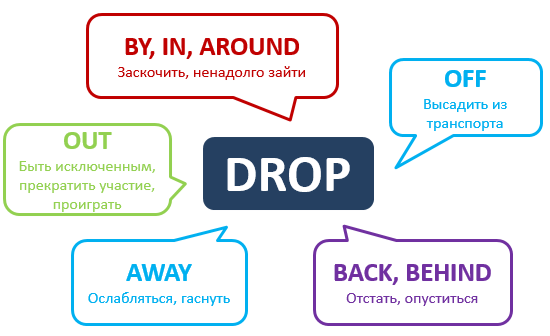- Что значит you dropped this
- It means you dropped something. It sounds like the person was saying it in a jokingly or sarcastic manner. Perhaps the person was shy or not very confident when they were telling you that.
- Что значит you dropped this
- Откройте возможности нейронного машинного перевода PROMT
- Фразовый глагол недели — «To Drop Off»
- 1. To drop (someone) off — довезти / подбросить / высадить
- 2. To drop (something) off — занести, завезти (что-то), доставить, оставить
- 3. To drop off — снизиться, упасть, уменьшиться
- . 4 . To drop off — засыпать, дремать
- На сегодня у меня все. Если у вас все еще есть вопросы по поводу этого глагола – смело задавайте их в комментариях! С удовольствием отвечу на каждый ❤️
- Phrasal verb Drop
- Категории грамматики
- Артикли
- Вопросы
- Герундий
- Инфинитив
- Косвенная речь и согласование времен
- Местоимения, числительные
- Модальные глаголы
- Отдельные глаголы
- Пассивный залог
- Порядок слов
- Прилагательные и Наречия
- Продолженное время
- Простое время
- Сложноподчиненное
- Совершенное время
- Совершенное продолженное время
- Союзы и предлоги
- Существительное
- Условное наклонение
- Фразовые глаголы
- Хочешь учить английский не напрягаясь?
- practice.grammar
- I dropped vs I have dropped
- Nonchalanto
- Liam Lew’s
- bicontinental
- Nonchalanto
- bicontinental
- RM1(SS)
- Wordy McWordface
Что значит you dropped this
- Английский (американский вариант)
It means you dropped something. It sounds like the person was saying it in a jokingly or sarcastic manner. Perhaps the person was shy or not very confident when they were telling you that.
Символ показывает уровень знания интересующего вас языка и вашу подготовку. Выбирая ваш уровень знания языка, вы говорите пользователям как им нужно писать, чтобы вы могли их понять.
Мне трудно понимать даже короткие ответы на данном языке.
Могу задавать простые вопросы и понимаю простые ответы.
Могу формулировать все виды общих вопросов. Понимаю ответы средней длины и сложности.
Понимаю ответы любой длины и сложности.


Решайте свои проблемы проще в приложении!

Источник
Что значит you dropped this


Откройте возможности нейронного машинного перевода PROMT
PROMT.One (www.translate.ru) – бесплатный онлайн-переводчик на основе нейронных сетей (NMT) для азербайджанского, английского, арабского, греческого, иврита, испанского, итальянского, казахского, китайского, корейского, немецкого, португальского, русского, татарского, турецкого, туркменского, узбекского, украинского, финского, французского, эстонского и японского языков.
Изучайте времена и формы глаголов в английском, немецком, испанском, французском и русском языках в разделе Спряжение и склонение. Учите употребление слов и выражений в разных Контекстах. Мы собрали для вас миллионы примеров перевода на разные языки, которые помогут вам в изучении иностранных языков и подготовке домашних заданий.
Переводите в любом месте и в любое время с помощью мобильного переводчика PROMT.One для iOS и Android. Попробуйте голосовой и фотоперевод, скачайте языковые пакеты для офлайн-перевода.
Поделиться переводом
Но сейчас вы можете переводить только 999 символов за один раз.
Пожалуйста, войдите или зарегистрируйтесь, чтобы переводить до 5 000 символов единовременно. войти / зарегистрироваться
Добавить в избранное
Для добавления в Избранное необходимо авторизоваться
Источник
Фразовый глагол недели — «To Drop Off»
Hello, dear readers!
Герой сегодняшней повестки дня довольно многозначен. Но пусть вас это не пугает. Уверена, несколько его значений вы встречали или встречаете регулярно. Сегодня предлагаю рассмотреть наиболее распространенные definitions of this phrasal verb и поставить галочку ✔ напротив него в списке фразовых глаголов для изучения (постараюсь, чтобы информация была исчерпывающей) .
Маленькая грамматическая ремарка, прежде чем мы перейдем к разбору значений ➡ сам по себе глагол drop — правильный . Добавляем окончание -ed для образования второй и третьей форм, но не забываем про удвоение согласной ( dropped or dropping ).
1. To drop (someone) off — довезти / подбросить / высадить
Друзья засиделись у вас в гостях, а теперь просят подвезти домой? Скорее всего, в их просьбе вы услышите фразовый глагол — to drop off . А если по пути домой кто-то из них решит выйти возле магазина, то также воспользуется еще одним значением this phrasal verb — » высаживать «. Посмотрим на примеры:
- I’m about to leave – Сan I DROP you OFF somewhere on my way home? – Я собираюсь уходить – Могу подбросить тебя куда-нибудь по дороге домой?
- Could you DROP the kids OFF at school tomorrow? – Ты не мог бы завтра отвезти детей в школу?
- How did you get there? – My aunt DROPPED me OFF in her car – Как ты приехал сюда? – Тетя подбросила меня на машине
✅ Could you drop ME off at the station?
❌ Could you drop off ME at the station?
2. To drop (something) off — занести, завезти (что-то), доставить, оставить
В отличие от предыдущего значения, в этот раз мы занимаемся «доставкой» неодушевлённых предметов:
- I’ll come to your house tonight and drop off your cake pan – Я заеду к тебе вечером и завезу форму для выпечки
- She dropped this letter off to you – Она оставила тебе это письмо
3. To drop off — снизиться, упасть, уменьшиться
Cambridge Dictionary подсказывает нам, что if the amount, number, or quality of something drops off, it becomes less :
- That business had to close after sales dropped off sharply – Когда продажи резко упали, компанию пришлось закрыть
- Business dropped off a little during the summer – Летом продажи (как вариант) слегка падают
Отойдем от темы финансов и бизнеса и представим себе плотный обед, после которого вы вынуждены вернуться на работу и ждать окончания трудового дня.
Очевидно, что когда организм начинает тратить всю свою энергию на переваривание сытной еды, ваша концентрация снижается ( лично у меня, да) – your concentration drops off after lunch . И вы медленно начинаете.
. 4 . To drop off — засыпать, дремать
Вздремнуть можно во время поездки в транспорте, после тяжелого рабочего дня или как один мой коллега – в перерывах на работе.
- After I’ve eaten dinner, I can drop off with no trouble at all – После ужина я могу легко заснуть
- I must have dropped off during the show, because I don’t remember how it ended – Должно быть, я уснул во время шоу. Я не помню, чем оно закончилось
- I dropped off and missed the end of the film – Я задремал и пропустил конец фильма
Надеюсь, что вы вспомнили еще один фразовый глагол с таким же значением, который мы разбирали совсем недавно – to doze off . А если еще не читали материал, настоятельно советую ознакомиться 😌
На сегодня у меня все. Если у вас все еще есть вопросы по поводу этого глагола – смело задавайте их
в комментариях! С удовольствием отвечу на каждый ❤️
Если статья вам понравилась, не забудьте поставить 👍, так вы не пропустите мои новые выпуски в ленте и рекомендациях! See you soon!
Источник
Phrasal verb Drop
Категории грамматики
Артикли
Вопросы
Герундий
Инфинитив
Косвенная речь и согласование времен
Местоимения, числительные
Модальные глаголы
Отдельные глаголы
Пассивный залог
Порядок слов
Прилагательные и Наречия
Продолженное время
Простое время
Сложноподчиненное
Совершенное время
Совершенное продолженное время
Союзы и предлоги
Существительное
Условное наклонение
Фразовые глаголы
Хочешь учить английский не напрягаясь?
Попробуй наши бесплатные упражнения!

- Грамматические теги:
- drop phrasal verbs
Фразовый глагол drop несправедливо игнорируется многими преподавателями и студентами при изучении английского языка. Мы решили исправить это положение и просветить вас на предмет многочисленных фразовых сочетаний с этим глаголом.
Как видите, drop – несложный фразовый глагол, тем более, что разные сочетания имеют одинаковые значения. Давайте убедимся на примерах с переводом.
Drop by, in, around — «заскочить, ненадолго зайти»
Why don’t you drop by for coffee some time?
Drop away, off — «ослабляться, гаснуть»
Support for him has begun to drop away.
Drop back, behind — «отстать, опуститься»
Economic growth will drop back to 3% this year.
Drop off — «высадить из транспорта»
Can you drop the kids off at school this morning?
Drop out — «быть исключенным»
Too many students drop out of college after only one year.
Довольно прозрачный фразовый глагол английского языка, не так ли? Если хотите в этом убедиться на практике, пройдите наш несложный тест.
01 I thought I’d drop ___ to see how you are.
02 He dropped ___ and finished in sixth place.
03 She was injured in the first round and had to drop ___.
04 Maybe you’ll drop ___ and say hello to your brother?
05 Let’s drop ___ Tom and Jerry at the hamburger joint.
А вот на практике получается немного запутано? Хотите разобраться? Попробуйте свои силы в разговорном упражнении на фразовый глагол drop – уверены, у вас получится прекрасно оперировать предлогами и их значениями в сочетаниях с drop! Вперёд!
practice.grammar
Для этой статьи есть интерактивные упражнения на грамматику английского языка. Рекомендуем их пройти, чтобы легче усвоить тему «Phrasal verb Drop»
Источник
I dropped vs I have dropped
Nonchalanto
Member
Hello to everyone who is checking this thread out! I thank you in advance for doing this folks.
I am currently reading Oxford Practice Grammar (intermediate level) and there is an explanation I don’t get between past simple and present perfect there.
Here it is:
Present perfect: I’ve dropped my calculator (it’s on the floor now)
Past Simple: I dropped my calculator (but it seems to be OK)
The problem is I don’t see the clear difference. Does it necessary mean the calculator is still on the floor at the moment of the speaking? Can’t I pick up the calculator and say: «I’ve (just) dropped the calculator but it seems ok». Doesn’t this state agree with the known rule «We also use the Present Perfect Tense to talk about a past action that has the result in the present.»?
I mean «but it seems to be ok» is the result in the present. Ain’t I right?
Can you explain me where I am wrong?
P.S There are no time indicators in both sentences, I have written it as the book provides!
Please feel free to correct my writing, all your notes would be be a great help!
Liam Lew’s
Senior Member
bicontinental
Senior Member
Here it is:
Present perfect: I’ve dropped my calculator (it’s on the floor now)
Past Simple: I dropped my calculator (but it seems to be OK)
Without any context at all, I’m not so sure I can make those conclusions…(or any other, for that matter)…from your sentence examples above.
‘I’ve dropped my calculator many times, but it still works OK.’ (This refers to the ‘experience’ of having dropped it at many unspecified times in the past.) ‘I’ve dropped my calculator at least twice since I got it.’ (This is an example of what this grammar site refers to as “change over time”: http://www.englishpage.com/verbpage/presentperfect.html ) You may want to check out the website and make your own examples.
I think my reaction to the second statement, (‘I dropped my calculator’), without further context would be to ask, “when?” With the simple past there’s usually a reference to a specific time in the past, e.g. ‘I dropped my calculator this morning and it’s no longer working’. For more on the simple past, you may want to look at this English grammar page: http://www.englishpage.com/verbpage/simplepast.html.
Nonchalanto
Member
Without any context at all, I’m not so sure I can make those conclusions…(or any other, for that matter)…from your sentence examples above.
‘I’ve dropped my calculator many times, but it still works OK.’ (This refers to the ‘experience’ of having dropped it at many unspecified times in the past.) ‘I’ve dropped my calculator at least twice since I got it.’ (This is an example of what this grammar site refers to as “change over time”: http://www.englishpage.com/verbpage/presentperfect.html ) You may want to check out the website and make your own examples.
I think my reaction to the second statement, (‘I dropped my calculator’), without further context would be to ask, “when?” With the simple past there’s usually a reference to a specific time in the past, e.g. ‘I dropped my calculator this morning and it’s no longer working’. For more on the simple past, you may want to look at this English grammar page: http://www.englishpage.com/verbpage/simplepast.html.
Ok. Look at this situation: I sit in a class, I drop my calculator, I pick it up and my friend say: «What is it?». I answer: «Nevermind, I’ve just dropped my calculator, but it seems ok» Does this sentence make sense to you? or should I say «I dropped»?
That’s the point. It doesn’t have to be on the floor at the moment of the speaking.
bicontinental
Senior Member
In the situation you describe I’d say, “I just dropped my calculator, but it seems to be OK.” i.e. I’d use the simple past. To justify my answer, I’ll say that this falls under “an action completed in the past”, as detailed in the reference above in post 3 (“Use the Simple Past to express the idea that an action started and finished at a specific time in the past.”). The use of just is a reference to time in your example.
RM1(SS)
Senior Member
Without any context at all, I’m not so sure I can make those conclusions…(or any other, for that matter)…from your sentence examples above.
‘I’ve dropped my calculator many times, but it still works OK.’ (This refers to the ‘experience’ of having dropped it at many unspecified times in the past.) ‘I’ve dropped my calculator at least twice since I got it.’ (This is an example of what this grammar site refers to as “change over time”: http://www.englishpage.com/verbpage/presentperfect.html ) You may want to check out the website and make your own examples.
I think my reaction to the second statement, (‘I dropped my calculator’), without further context would be to ask, “when?” With the simple past there’s usually a reference to a specific time in the past, e.g. ‘I dropped my calculator this morning and it’s no longer working’. For more on the simple past, you may want to look at this English grammar page: http://www.englishpage.com/verbpage/simplepast.html.
I think I would only use «I have dropped» is in sentences like the ones given here — «. many times,» «. twice,» «a few times,» &c.
Other than that:
«What was that noise?»
«I dropped my calculator.»
«Why are you lying on the floor?»
«I dropped my calculator and it bounced under the couch.»
«What’s wrong with your calculator?»
«I dropped it.»
Senior Member
— «Why are you lying on the floor?»
— » I‘ve dropped my calculator and it‘s bounced under the couch.»
— «What’s wrong with your calculator?»
— » I‘ve dropped it.»
Suppose the dropping occurred five minutes ago. In that case, would the present perfect be used in the above two dialogs in British English? Are the bolded tenses correct? Thanks.
Wordy McWordface
Senior Member
Even in British English, the present perfect seems unlikely. We’d probably use the past simple.
In the first situation, we’re fairly ‘distanced’ from the moment of dropping the calculator. A number of things have happened since then. First you dropped it, then it bounced under the couch. Then you got down onto the floor and finally your friend came into the room and asked you why you were lying on the floor. This all puts the act of dropping far enough in the past for us to use a past simple: «I dropped my calculator and it bounced under the couch». If you refer to something which happened after the event in question, that earlier event needs to be in a past tense, not a present perfect.
I don’t really understand the second one. Do you mean that you dropped it, picked it up again and it’s now malfunctioning? If you do, then it’s definitely a case for the past simple.
We’d only use the present perfect if it’s something which has only just happened and you need to explain a current situation:
For example, you’re in a Zoom meeting with colleagues and you suddenly say «Oops! Hang on a moment. I’ve dropped my calculator». You’re saying this to explain why your face is going to disappear from the screen for a second or two while you bend down to pick up your calculator. [You could also use a past simple here — as many AmE speakers would — and it would be fine. There is no obligation to use a present perfect].
Alternatively, you could simply bend down and pick up your calculator and then explain why you had momentarily disappeared from the screen: «Sorry about that! I dropped my calculator.» [In this case, you have to use a past simple because the calculator is no longer on the floor. A present perfect would be wrong].
Источник









